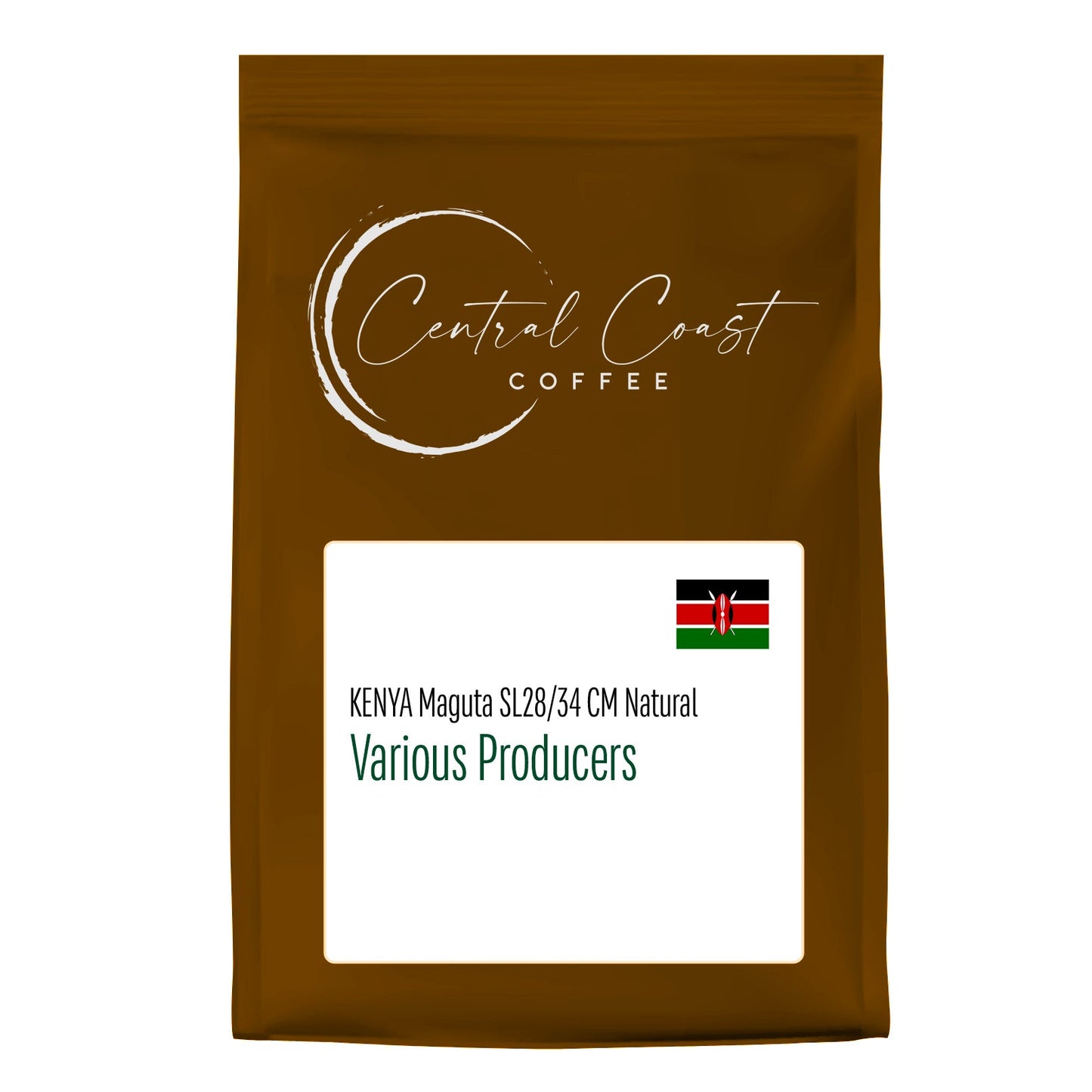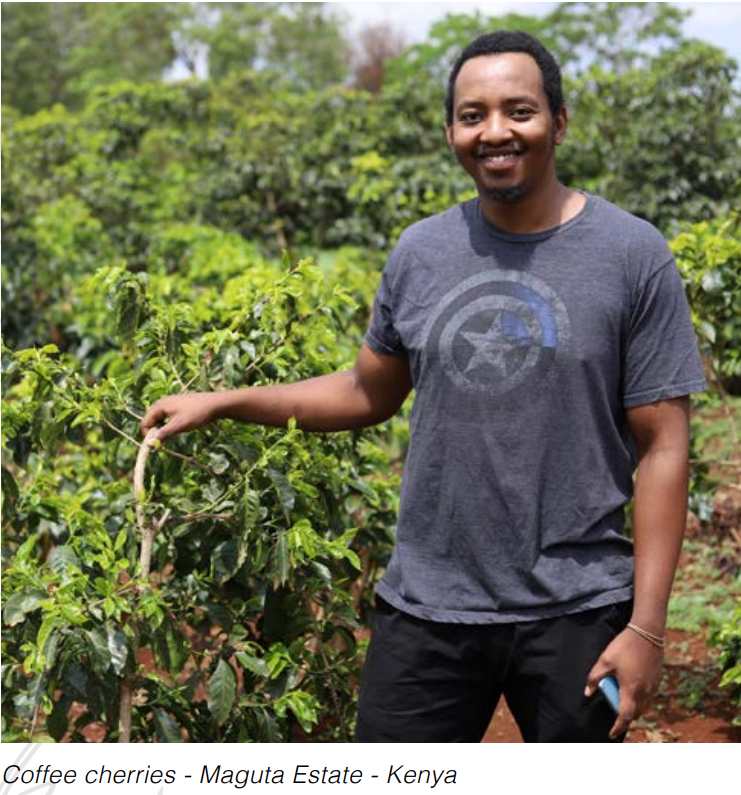

Are you looking to buy Kenya | Maguta Estate | SL28/SL34 | CM Super Natural | Signature Series in Australia?
-
More Info on this lotLOT: Maguta CM N Jasper C Lot 1
Processing Details
- Picking of only red cherries
- Cherries are placed inside sealed tanks and filled with CO2 pushing oxygen out
- Controlled yeast activity, temperature and humidity of tanks
- Extended anaerobic fermentation time in whole cherries at cool temperatures
- Cherries are removed from the tank and laid in thick stacks for slow drying
- Cherries are dried slowly over 25-35 days until moisture content is reduced to 10-12%
- Coffee is then delivered to the dry mill until export
More Info on the Maguta Coffee Estate
The Maguta Coffee Estate, run by our friend David Ngibuini, works across Nyeri and Embu counties in Central Kenya, and produces some of the most classically extraordinary Kenyan coffee you can access. The Murware Farmers who deliver their cherries to this Estate possess a team spirit and assist each other to maintain their farming standards. This group is a fast-growing cluster of farmers in the Muruguru area with a collective 18000 trees growing coffee cherries on red volcanic soils.The Maguta Estate contains enough materials to process coffee to a high-quality that allows the producers and farmers to be paid a better income. It has 10 fermentation tanks, 3 shaded parabolic drying tables each with a 1-tonne capacity, an all concrete fermentation room, Brix meter, pH meter, and more to help improve the processing quality. In addition, Project Origin have collaborated with Maguta Estate to build carbonic maceration infrastructure that can be used to process coffee from all the farmers in the region, as a way of building a sustainable resource for producing high-quality grade coffees.Recently, the Kenyan coffee sector has slowly declined in production due to farmers moving away from coffee production to alternative cash crops, a decision driven by the poor payments to the farmers for their work. By working with Maguta Estate, we hope to help them reach their goals of empowering the communities and improving their livelihoods by building the resources they need to increase their coffee quality, and therefore, increase the prices of the cherries they work to produce.About SL28/SL34
SL28 is one of Kenya’s most famous coffee varieties, developed in the 1930s by Scott Agricultural Laboratories. Known for its high-quality cup profile, SL28 produces rich, fruity flavors with bright acidity and strong citrus notes, making it highly sought after by specialty coffee enthusiasts. The variety thrives in higher altitudes, where it benefits from the unique climate and soil conditions found in regions like Mount Kenya. SL28 is drought-resistant, making it resilient in harsh growing environments, but it is susceptible to diseases such as Coffee Leaf Rust (CLR) and Coffee Berry Disease (CBD), which limits its overall production.
Despite its disease vulnerabilities, SL28 continues to be favored for its exceptional flavor profile, often commanding premium prices in global markets. Farmers typically balance the risks of growing this variety by planting it alongside more resistant varieties. Its ability to produce complex, vibrant coffee has made SL28 a cornerstone of Kenya’s coffee reputation, and it continues to be cultivated in smallholder farms across the country, contributing to Kenya’s status as a producer of some of the world’s finest coffees.
Coffee in Kenya
Kenya is renowned globally for producing some of the finest specialty coffee, known for its bright acidity, complex flavors, and rich body. Coffee cultivation in Kenya dates back to the late 19th century when it was introduced by French missionaries, but it was in the 20th century that Kenya's coffee industry truly flourished. The country's unique geographical conditions, such as its high-altitude regions, fertile volcanic soils, and temperate climate, create ideal growing environments for Arabica coffee. Coffee farming is predominantly done by smallholder farmers, many of whom belong to cooperatives that pool their resources and share processing facilities, contributing to the high standards of production and processing that Kenya is known for.
Kenya's coffee varieties, such as SL28, SL34, Ruiru 11, and Batian, have been developed through extensive agricultural research to optimize flavor profiles and improve resilience to diseases. SL28 and SL34 are especially prized for their exceptional cup qualities, offering vibrant fruit notes, wine-like acidity, and floral undertones. Ruiru 11 and Batian, more recent developments, were introduced to combat challenges such as Coffee Leaf Rust and Coffee Berry Disease while still maintaining desirable flavor characteristics. The country's grading system, based on size and density (with AA being the highest grade), further highlights its focus on quality control. Kenyan coffee is often sold through auction systems, which helps ensure competitive pricing and transparency in the market.
The coffee industry is a significant part of Kenya's economy, employing over 700,000 small-scale farmers. However, in recent years, Kenyan coffee production has faced challenges such as fluctuating global coffee prices, climate change, and the younger generation’s declining interest in farming. Despite these hurdles, Kenyan coffee remains highly sought after in the specialty market, where its distinctive cup profile continues to attract premium prices. Efforts to modernize farming practices, invest in disease-resistant varieties, and increase support for smallholder farmers are key to ensuring that Kenya maintains its status as a global leader in the production of high-quality coffee.
SKU: ken_maguta_cm_160g
Package Weight: 200g


